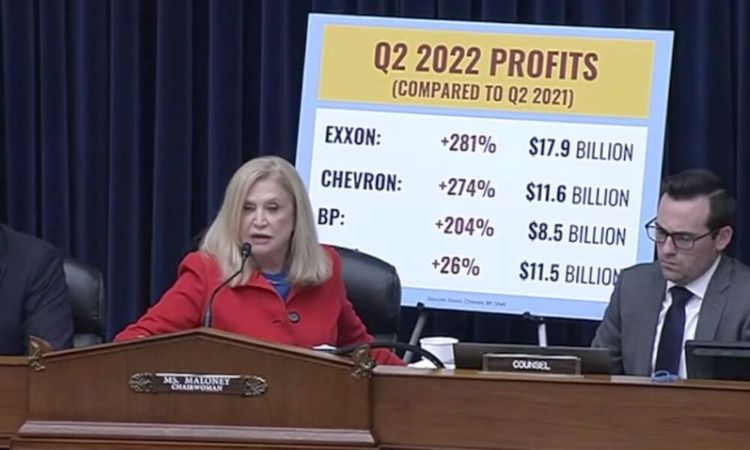Drilled Down: Indigenous Water Protectors, Allies Protesting Line 3 First Ever To Be Cited under Obscure County Ordinance in Minnesota

By Karen Savage
Opponents to Enbridge’s Line 3 pipeline expansion project in Minnesota have filed a lawsuit against Hubbard County for blockading access to an Indigenous-led camp and convergence space.
In the suit, which was filed Friday in Hubbard County District Court, Winona LaDuke, Tara Houska, and two additional plaintiffs allege that the Hubbard County Sheriff’s Office illegally blockaded the camp driveway last month and is continuing to issue citations to Indigenous water protectors and their allies for using the driveway.
They are the first and only individuals ever to be cited for allegedly violating county ordinance #36, which went into effect in 2007, according to public records obtained by Drilled News. The ordinance prohibits vehicular use on certain county-owned land without the county’s permission.
The citations raise questions about whether the sheriff’s department is selectively enforcing the law, and about the financial arrangement Enbridge has with Minnesota law enforcement.
The Hubbard County Sheriff’s Office is a member of the Northern Lights Task Force a coalition of state and local law enforcement and public safety agencies created to respond to pipeline resistance.
The task force was assembled in 2018 to “coordinate planning, resources and response” to Line 3 construction and possible protests. Members include law enforcement agencies from 15 Minnesota counties near and along the pipeline route, as well as the Fond du Lac Reservation.
Records indicate Minnesota officials sought out advice from North Dakota law enforcement officials in the wake of mass resistance to the Dakota Access pipeline, where counter-terrorism tactics were used against Indigenous water protectors, their allies, and journalists.
To date, Enbridge has paid over $1 million to law enforcement and other Minnesota agencies for pipeline protection through an escrow account funded by the company and managed by a state-appointed administrator.
The account was set up last year as a condition of the Line 3 permit issued by Minnesota’s Public Utilities Commission, purportedly to avoid burdening taxpayers with public safety-related expenses. Pipeline opponents say the arrangement, thought to be one of the first in the nation, has turned local sheriff’s deputies into corporate mercenaries.
“Shame on Hubbard County, shame on Minnesota, and shame on public servants who have clearly forgotten who their duty is owed to,” said Tara Houska, an environmental and Indigenous rights attorney and a leader of efforts to stop Line 3. “Enbridge is a foreign corporation sucking Minnesota’s rivers dry, violating Anishinaabe treaty rights, and colluding financially with Minnesota’s police forces. What part of any of that is in the public interest?”
The camp property has no utility hook-ups and is only accessible via a driveway that runs through a 150-foot strip of land owned by Hubbard County. Water must be hauled in from a nearby town.
Land records and aerial photographs from 1978 show that the section of driveway in question has been in existence for decades and predates the ordinance.
Previous owner Winona LaDuke in 2018 was granted an easement from the Hubbard County Board of Commissioners to use the driveway. Switchboard Trainers Network, which now owns the property, says the easement is still valid.
But at 6am on June 28—with no prior notice—Hubbard County Sheriff’s deputies delivered a note stating that the driveway would be barricaded at 10am. The notice was signed by Sheriff Aukes and county land commissioner Mark Lohmeier. At around 9am, sheriff’s deputies began blocking individuals from leaving the camp and prevented others from bringing food and water into the camp, according to the complaint.
As the hours passed, the police presence grew.
“Hubbard County showing up at a private Indigenous home with a riot line was obscene,” Houska said in a press release.
“They arrested 12 people, violently in some cases. Being thrown into the dirt of our driveway and cuffed is a gross abuse of power that sets a dangerous precedent for all private landowners,” Houska, who lives on the property added. “At one point, there were almost 50 squad cars on the dirt road in front of our home, sheriffs in the woods, sheriffs pushing forward in our driveway—I prepared myself to go into our sweat lodge, next to our gardens, and be dragged out that way. Nobody should ever have to do that.”
Although the sheriff’s office is no longer actively blockading the driveway, plaintiffs say Hubbard County deputies continue to surveil and harass their guests. To date, more than two dozen citations have been issued for alleged violations of the ordinance.
When asked, neither Aukes nor Bill Schlag, a Sheriff’s Department investigator who issued several of the citations, could say what the penalty would be.
According to the ordinance, the violations are misdemeanors, which in Minnesota are punishable by up to 90 days in jail and a $1,000 fine. Because the violations are the first ever issued and the court has discretion in sentencing, it is unknown how the judge might rule.
Aukes, who said he has not seen the complaint against him and questioned its validity, maintains the current owners do not have a valid easement. He denies allegations that his department is singling out water protectors or the camp.
“A previous owner did it proper and went and got an easement as required by law to access their property through the county land,” Aukes said. “They’re violating the county ordinance by driving on the county land, they can access it by other means— they can walk into it, it’s only 150 feet that we’re talking about. ”
Aukes acknowledged it is illegal to park on nearby roadways.
The property is home to Namewag Camp, an Indigenous woman and two-spirit-led camp opposed to Line 3. They say construction of the Enbridge project violates the treaty rights of Anishinaabe peoples and nations in its path.
If completed, the project will also exacerbate climate change. The new pipeline will carry nearly a million barrels per day of tar sands oil—one of the most carbon-intensive fossil fuels on the planet— from Alberta, Canada to the shore of Lake Superior in Wisconsin.
It will cross 227 lakes and rivers—including the Mississippi River—run through over 800 protected wetlands and cut across ceded lands where the Red Lake Band of Chippewa Indians and White Earth Band of Ojibwe exercise hunting, fishing, and gathering rights pursuant to federally recognized treaties. The pipeline will also jeopardize culturally important wild rice beds and risk catastrophic spills, according to opponents.
The plaintiffs are seeking an injunction to prevent Hubbard County Sheriff Corwin Aukes, land commissioner Mark Lohmeier and the county from “blockading, obstructing, or otherwise interfering with access to the property”.
They are also asking the court to permanently allow vehicles to access the driveway, to invalidate all related citations, and to destroy the personal data of those who have been cited.
Frank Bibeau, executive director of the 1855 Treaty Authority, which represents approximately 25,000 Chippewa tribal members who are current beneficiaries of the 1855 Chippewa Treaty with the United States, says the matter was settled more than a century ago.
The 1855 treaty grants the Chippewa “a superior, federal, perpetual conservation easement” and the right to access “public lands and public waters using public roads,” Bibeau said in a letter sent to Aukes last month.
“Please consider the disproportionate and disparate impacts on federally-protected, tribal member’s rights to access privately held, fee owned property, by existing road to that land, where people are exercising free speech and freedom of religion,” Bibeau wrote.
“Ask yourselves, are you blocking or barricading anyone else’s only, and sole, existing roadway access to the privately-held, fee lands?,” Bibeau continued. “Is the normal Hubbard practice to send a Sheriff with a 4-hour notice for private landowner disputes, which are usually civil in nature, without any direction from the Hubbard County governing body or court order?”
*This reporter is among those who have been issued citations; she was cited while reporting on the Line 3 resistance.





